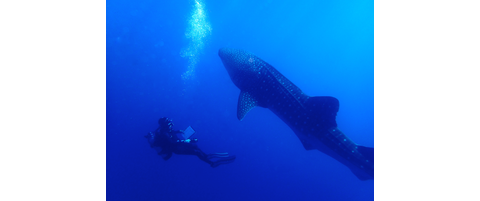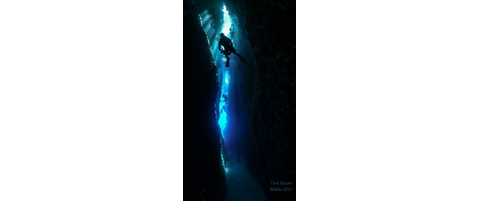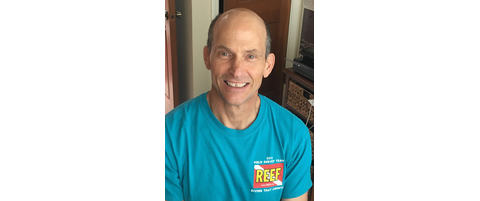Since 1993, more than 16,000 volunteers have conducted at least one REEF survey as part of the Volunteer Fish Survey Project. Today, the survey database totals more than 248,000 surveys. A small group of highly dedicated surveyors known as the Golden Hamlet Club have contributed significantly to this total by conducting 1,000+ REEF surveys. Congratulations to Chuck Curry, the newest member of the Golden Hamlet Club! Read on to learn more about Chuck and his involvement with the Volunteer Fish Survey Project. You can also read more about the Golden Hamlet Club here.
You did your first REEF survey on March 8, 2013, at Norranders Reef in Washington. What got you started?
I got started after hearing about REEF during a presentation at the Seattle Aquarium by a local marine wildlife and ecosystem research/conservation organization, the SeaDoc Society, proposing to use surveyors from REEF's Pacific Northwest Advanced Assessment Team to conduct monitoring in the San Juan Islands. I wanted to be involved with that, had recently started diving again after a long surface interval, and got started close to home (~7 minute drive) at Norranders Reef.
When and where did you do your 1,000th survey? Tell us anything memorable about your 1,000th survey.
I did my 1,000th survey in Indonesia and, while I knew I’d reach 1,000 at some point on the trip, I didn’t know which survey it had been until I’d submitted them. It happened on October 15, 2019, at a site named Terbang Utara NW Side. “Utara” means “North” in Indonesian and Terbang is the name shared by two small islands, one north and one south, located just south of Damar island in the southern Banda Sea. I reported a Pontohi Pygmy Seahorse on the dive, though I’m sure I didn’t spot it myself!
In which regions have you done surveys? What experience levels are you in those other regions? Do you have any favorite dive spots in those places?
I’ve been fortunate to survey in seven regions. After starting in the Pacific Northwest, I went on REEF trips to Hawaii, Bonaire and Dominica. I had wonderful and experienced dive buddies on each trip and my eyes opened to the delights of tropical diving. In the last few years I’ve surveyed in the Tropical Eastern Pacific (TEP), Central Indo-Pacific (CIP), South Pacific (SOP) and the Indian Ocean/Red Sea (IORS) regions. I’m a Level 5 Surveyor in the PNW, TWA, HAW, CIP and SOP; Level 4 in the IORS and Level 2 in the TEP.
What are some of your favorite fishes or invertebrates? What makes them your favorite?
Some of my favorite fishes are those in the Wrasse family. They’re often brightly colored and beautiful, their different phases make identifying them a fun challenge, they’re found in a wide array of habitats, and their life histories are interesting.Having started in the Pacific Northwest, where selected invertebrates are surveyed along with fishes, I certainly do make time for critters with no spine! The Giant Pacific Octopus is one of my favorite invertebrates and—back to fish!—like nearly every Pacific Northwest diver, I just love those Wolf-eels.
What is your favorite thing/memory about REEF and the Volunteer Fish Survey Project?
Though it’s difficult to single out a favorite thing or memory from all the positive experiences I’ve had participating in the VFSP: the fellow surveyors who’ve become good friends, the opportunity to contribute as a citizen scientist, the hours spent in the ocean intently tuned-in to what’s happening; I feel particularly grateful for the travel experiences that have come with surveying. The VFSP has taken me to places and introduced me to people I’m quite sure I’d have never visited or met otherwise.
What are your goals with REEF for the future?
I’d like to keep on surveying and exploring different parts of our World Ocean! My wife, Kara, is also an active surveyor and, while we love surveying on SCUBA together, we’ve recently begun surveying while snorkeling and free diving. We enjoy the different perspective of free diving, getting to sites and habitats more difficult to access on SCUBA, and finding new (to us) and interesting fishes there.
Thank you, Chuck, for being a part of REEF! We appreciate your efforts and dedication to furthering marine conservation through citizen science.




